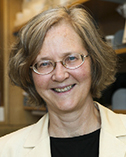
Elizabeth Blackburn
University of California, San Francisco
|
Primary Section: 21, Biochemistry Membership Type:
International Member
(elected 1993)
|
Biosketch
Throughout her career in scientific research Dr. Blackburn has been a leader in the area of telomere and telomerase research, having discovered the molecular nature of telomeres – the ends of eukaryotic chromosomes that serve as protective caps essential for preserving the genetic information – and co-discovered the ribonucleoprotein enzyme, telomerase. She and her research group at UC Berkeley, and then at UCSF, contributed many of the original foundational research discoveries on telomerase and the biology of telomeres. Dr. Blackburn and her UCSF research team continue their work with various cells (including human cells), with the goal of understanding telomerase and telomere biology. She and her research team also collaborate in a wide range of investigations of the roles of telomere biology in human health and diseases, through clinical and other human studies. Born in Australia, Dr. Blackburn earned her B.Sc. and M.Sc. degrees from the University of Melbourne, and her Ph.D. from the University of Cambridge in England. She was a postdoctoral fellow in the Molecular and Cellular Biology Department at Yale University. Professor Blackburn has won many prestigious awards throughout her career including the Albert Lasker Medical Research Award for Basic Medical Research, being named in 2007 as one of TIME Magazine’s 100 Most Influential People, and in 2009 being awarded the Nobel Prize in Physiology or Medicine.
Research Interests
Currently, Dr. Blackburn and her UCSF research team continue their work with various cells (including human cells), with the goal of understanding telomerase and telomere biology. She and her research team also collaborate in a wide range of investigations of the roles of telomere biology in human health and diseases, through clinical and other human studies.

